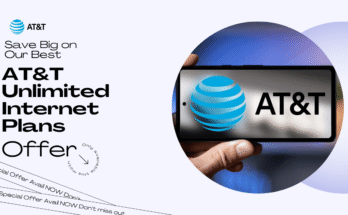Choosing between Verizon Fios or AT&T Fiber services presents a complex task because users find equally excellent performance with their fiber-optic connections. Reputably reliable and affordable Internet access comes from Verizon Fios, yet AT&T Fiber extends its service areas more widely and provides higher connection speeds. An evaluation will investigate the benefits and drawbacks of both providers by examining coverage areas and speed capabilities, together with pricing structures and extra services that aim to assist users in selecting services that match their specific needs.
Verizon Fios vs AT&T Fiber Overview
Two dominant fiber-optic internet service providers operate in the U.S., with Verizon Fios competing against AT&T Fiber using separate competitive advantages. AT&T Fiber extends its service reach to 27.8 million locations in 22 states, whereas Verizon Fios delivers its services to 15 million customers across nine northeastern states. The network speed offered by AT&T Fiber reaches a peak of 5 Gbps, which surpasses the maximum speed Verizon provides at 2.3 Gbps. This comparison also extends to AT&T vs Verizon unlimited plans and AT&T unlimited plan vs Verizon unlimited plan.
AT&T maintains more economical prices than its competitors for plans that provide equivalent services. The providers present free equipment as well as unlimited data alongside no-contract solutions to their customers. The choice of customers depends on local options as their service zones typically do not intersect.
Verizon Fios vs AT&T Fiber Plans and Pricing
Verizon Fios Plans
| Plan | Monthly cost | Connection type | Download speed |
|---|---|---|---|
| Fios 300 Mbps | $34.99/month | Fiber-optic | 300 Mbps |
| Fios 500 Mbps | $59.99/month | Fiber-optic | 500 Mbps |
| Fios 1 Gig | $74.99/month | Fiber-optic | 940 Mbps |
| Fios 2 Gig | $94.99/month | Fiber-optic | 2300 Mbps (2.3 Gbps) |
AT&T Fiber Plans
| Plan | Monthly Price | Speed | Key Features | Reward Card |
|---|---|---|---|---|
| Internet 300 | $55 (with AutoPay & paperless billing) | 300 Mbps | Equal upload/download speeds, can connect 10+ devices, and has a 15x faster upload than cable | $50 |
| Internet 500 | $65 (with AutoPay & paperless billing) | 500 Mbps | Equal upload/download speeds, more bandwidth for connected households, 20x faster upload than cable | $100 |
| Internet 1000 | $80 (with AutoPay & paperless billing) | 1 Gbps | Pro-level performance, ultra-low gaming lag, 25x faster upload than cable | $150 |
Verizon Fios vs. AT&T Fiber Pros and Cons
The Internet service providers Verizon Fios and AT&T Fiber offer fiber-optic solutions that possess separate sets of benefits and drawbacks. These services differ in their advantages and drawbacks when we compare them as follows.
Verizon Fios
Pros
- The provider offers an agreement-free system that lets customers perform upgrades or downgrades or terminate service without facing additional fees.
- 99.9% reliability due to fiber-optic technology.
- Cable equipment does not require additional expense since it comes free with monthly payments.
- Competitive pricing, starting at $35/month for 300Mbps.
- Most plans from these providers include equal upload and download speed capabilities.
Cons
- Limited availability; currently only in nine states.
- Potential installation and activation fees.
- Part of the customer feedback indicated slower support response times from AT&T.
- In addition, Verizon Wireless Internet, Verizon Internet plans, AT&T Internet, AT&T Internet plans, and AT&T Internet Air are also important factors to consider.
AT&T Fiber
Pros
- Wider availability across 22 states.
- The maximum speed cap reaches 5 Gbps because of these internet connections.
- The service provides customers with free Wi-Fi devices that use Wi-Fi 6 technology.
- Unlimited data on all fiber plans.
- Symmetrical upload and download speeds.
Cons
- Price rates increase at the start of the second year outside of the initial contract term on certain plans.
- Limited TV bundling options.
Coverage and Availability
The coverage maps of AT&T and Verizon present distinct territories. The network coverage of AT&T Fiber reaches 21 states, primarily in the Midwest and South regions of the United States. Among the two services, Verizon Fios internet only operates throughout 9 specific states, which primarily reside in the Northeast region. The differing extent of coverage fields decides purchasing decisions for numerous customers who live beyond city centers.
Speed and Performance
AT&T Fiber provides superior speed performance than Verizon Fios because its highest plan delivers up to 5 Gbps. Verizon Fios operates at a maximum speed of 2.3 Gbps throughout specific New York City areas, along with other select regions. Most domestic households benefit from streaming and gaming capability together with home office automation through the base network packages provided by both Verizon and AT&T.
Additional Features
Verizon Fios Perks
The service allows customers to choose no contracts, which enables immediate plan cancellation or upgrade at any time without facing financial penalties.
- Free equipment: Includes routers for seamless setup.
- The Bundles option lets customers enjoy bundled packages, which include streaming services such as Netflix and Amazon Prime.
- Homeowners receive a $25 reduction in their internet bill each month by linking Verizon Wireless services to their internet plan.
AT&T Fiber Perks
The package includes Wi-Fi 6 technology that comes with free Wi-Fi gateways.
Unlimited data: No overage fees on any plan.
- AT&T gives customers bundle price reductions that work when they purchase their wireless service from AT&T.
- Customers who maintain Verizon Wireless service qualify for mobile price reductions, while both Verizon and AT&T provide their subscribers with cost-free equipment together with endless data access.
Verizon Wireless vs AT&T Wireless
The companies also deliver wireless services, even though they primarily concentrate on providing fiber internet. Unlimited plan prices between Verizon and AT&T match up across their top-tier options since Verizon charges $90/month for Unlimited Ultimate and AT&T requests $85.99/month for Unlimited Premium.
Conclusion
Which telecommunication service works best for you depends on the elements that matter most to you. Customers who want cost-effective fiber services at a basic level should choose Verizon Fios, especially those who already use Verizon Wireless mobile services. You should opt for AT&T Fiber if you require maximum internet speeds or live in an area where Verizon Fios cannot reach. The internet delivery services from both Verizon Fios and AT&T Fiber ensure reliable high-performance connections that lead to excellent fiber-optic network quality. To learn more about Verizon Fios vs. AT&T Fiber Deals, contact the Internet Cost Saver customer care number – +1(855) 208-9742.



